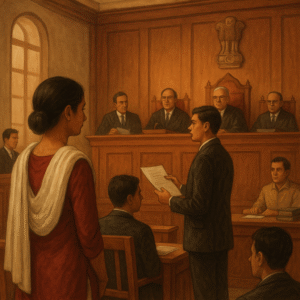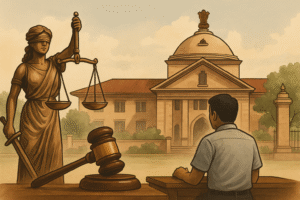Simplified Explanation of the Judgment
In a significant decision protecting the financial rights of retired government employees, the Patna High Court quashed an order that directed recovery of ₹1,38,633 from the pension and gratuity of a retired health worker. The Court held that since the excess payment was made due to a government error—and not due to any fraud or misrepresentation by the employee—such recovery was legally unjustified.
The petitioner, a retired Basic Health Worker from Arwal district, approached the Court challenging a letter dated 11.09.2018 issued by the Accountant General’s office, which directed the Treasury Officer to deduct ₹1,38,633 from his post-retirement benefits. The amount was claimed as excess payment received during service, allegedly due to a wrong pay scale and grade pay fixation after the grant of financial upgradations under the Assured Career Progression (ACP) scheme.
The government’s position was that, based on a 2016 clarification by the Finance Department, it was found that the petitioner was wrongly granted a grade pay of ₹4,200 instead of the correct ₹2,800 during his third ACP. Accordingly, his salary was revised, and the excess amount was ordered to be recovered from his pension and gratuity.
However, the High Court rejected this rationale. Justice Mohit Kumar Shah pointed out several important legal findings:
- The petitioner had not committed any fraud or misrepresented facts to receive the higher grade pay.
- The wrong pay fixation was the fault of the employer, not the employee.
- The petitioner had already retired, and the recovery order was issued after superannuation.
The Court cited multiple Supreme Court decisions, particularly the landmark ruling in State of Punjab v. Rafiq Masih (2015) 4 SCC 334. That judgment lays down clear categories where recovery is not permissible, including:
- Recovery from retired employees.
- Recovery where there was no fraud or misrepresentation.
- Recovery after a long period of excess payment (over 5 years).
- Recovery where it would cause hardship or arbitrariness.
Since the case fit squarely into these categories, especially the first two, the High Court quashed the recovery order and directed the government to refund the deducted amount to the petitioner within 12 weeks.
Significance or Implication of the Judgment
This judgment has wide-reaching implications for thousands of government pensioners in Bihar and across India. It reaffirms that:
- Pension and gratuity are protected rights, and arbitrary deductions cannot be made after retirement.
- Errors made by government authorities, especially in pay fixation, cannot be the basis for penalizing employees post-retirement.
- The Supreme Court’s guidelines in Rafiq Masih are binding and must be followed by all administrative and accounting departments.
For retired public servants, this decision reinforces their financial security and legal safeguards against post-retirement harassment. For government authorities, it is a reminder to act with procedural fairness and adhere to judicial precedents when issuing recovery orders.
Legal Issue(s) Decided and the Court’s Decision with Reasoning
- Can the government recover excess payment from a retired employee’s pension/gratuity when no fraud was committed?
- ❌ No. The High Court held such recovery is impermissible under the law.
- Is recovery allowed for wrong grade pay granted due to employer’s mistake?
- ❌ No. Mistakes made by the employer cannot be grounds for recovery from the employee post-retirement.
- Does the case fall under the barred categories identified in Rafiq Masih judgment?
- ✔️ Yes. The petitioner was a retired employee, and there was no fraud or misrepresentation involved.
- Final Outcome:
- Recovery order dated 11.09.2018 quashed.
- Government directed to refund ₹1,38,633 to the petitioner within 12 weeks.
Judgments Referred by Parties
- Syed Abdul Qadir v. State of Bihar, (2009) 3 SCC 475
- Sahib Ram v. State of Haryana, (1995) Supp (1) SCC 18
- Shyam Babu Verma v. Union of India, (1994) 2 SCC 521
- B. Ganga Ram v. Regional Joint Director, (1997) 6 SCC 139
- Purshottam Lal Das v. State of Bihar, (2006) 11 SCC 492
- State of Punjab v. Rafiq Masih, (2015) 4 SCC 334
Judgments Relied Upon or Cited by Court
- State of Punjab v. Rafiq Masih, (2015) 4 SCC 334
Case Title
Ramashraya Sharma vs. The State of Bihar & Ors.
Case Number
Civil Writ Jurisdiction Case No. 22696 of 2018
Citation(s)
2021(1)PLJR 90
Coram and Names of Judges
Hon’ble Mr. Justice Mohit Kumar Shah
Names of Advocates and who they appeared for
- For the Petitioner: Mr. Shiv Kumar
- For the Respondents: Mr. Rajeshwar Singh
Link to Judgment
https://patnahighcourt.gov.in/viewjudgment/MTUjMjI2OTYjMjAxOCMxI04=-9tyFZ7ZvP–am1–g=
If you found this explanation helpful and wish to stay informed about how legal developments may affect your rights in Bihar, you may consider following Samvida Law Associates for more updates.








